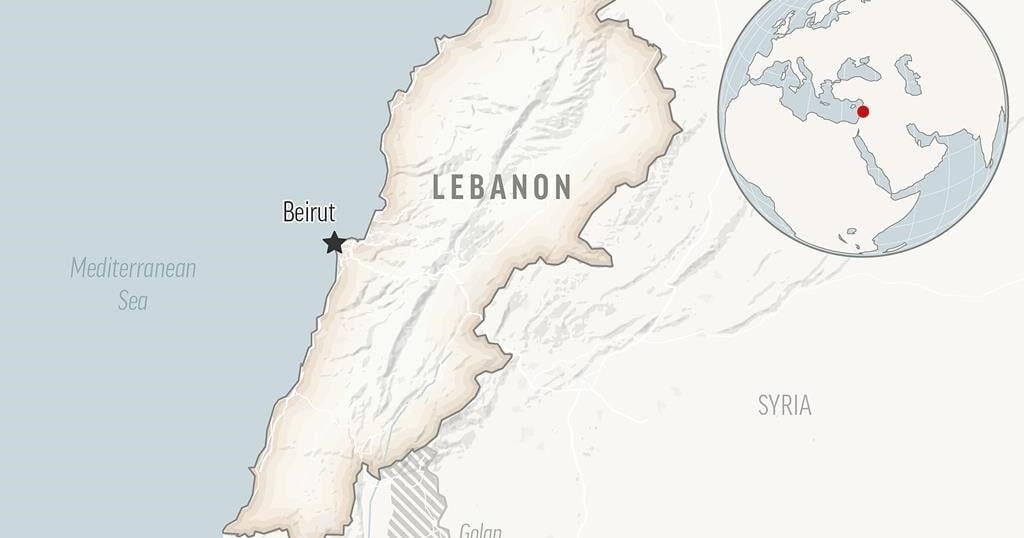JERUSALEM (AP) — Israel and the Lebanese militant group Hezbollah traded heavy fire early Sunday but backed off from sparking a widely feared all-out war, as both sides signaled their most intense exchange in months was over.
The cross-border attacks came as high-level talks resumed in Egypt aimed at a cease-fire between Israel and Hamas in the war in Gaza that also would ease regional tensions.
Hezbollah claimed to hit an Israeli military intelligence site near Tel Aviv in a barrage of hundreds of rockets and drones, and Israel claimed its strikes had been preemptive to avert a larger attack. Neither offered evidence.
Hezbollah leader Hassan Nasrallah said the attack, a response to Israel’s killing of a top militant commander in Beirut last month, had been delayed to give the Gaza cease-fire talks a chance, and so fellow Iran-backed groups could discuss with Iran whether to attack Israel all at once. Israeli and U.S. military deployment also played a role.
“We will now reserve the right to respond at a later time” if the results of Sunday’s attack aren’t sufficient, Nasrallah said, adding that allied Houthi rebels in Yemen — and Iran itself — had yet to respond. But he told the Lebanese people: “At this current stage, the country can take a breath and relax.”
Israel’s military said its intelligence base near Tel Aviv wasn’t hit.
Israel and Hezbollah said they aimed only at military targets. Israel’s military said one soldier with the navy was killed and two others were wounded either by an interceptor for incoming fire, or by shrapnel from one. Two Hezbollah fighters and a militant from an allied group were killed, the groups said.
Israeli Prime Minister Benjamin Netanyahu said the military eliminated thousands of rockets that were aimed at northern Israel and shot down drones heading for the center of the country.
“I repeat — this is not the end of the story,” he added.
Flights diverted as air raid sirens wail
Air raid sirens were reported throughout northern Israel, and Israel’s international airport closed and diverted flights for about an hour. Israel’s Home Front Command later lifted restrictions in most areas.
An Israeli military spokesman, Lt. Col. Nadav Shoshani, said Hezbollah intended to hit targets in northern and central Israel but initial assessments found “very little damage.” He said around 100 Israeli aircraft took part in the strikes.
Hezbollah said its attack involved more than 320 Katyusha rockets aimed at multiple sites in Israel and a “large number” of drones.
Some Israelis were shaken. In the northern city of Acre, retired teacher Saadia Even Tsur, 76, said he was at the synagogue when his bedroom was damaged and arrived home five minutes later. “I went up and saw the size of the miracle that happened to me,” he said. A window was broken and debris was on his bed.
Lebanon’s caretaker Economy Minister Amin Salam, after an emergency government meeting, said officials were “feeling a bit more optimistic” about a de-escalation. “We feel more reassured since both sides confirmed that the expected operations ended,” he said.
President Joe Biden was “closely monitoring events in Israel and Lebanon,” according to Sean Savett, a spokesman for the National Security Council. The Pentagon said Defense Secretary Lloyd Austin spoke with his Israeli counterpart, Yoav Gallant. The chairman of the Joint Chiefs of Staff, Gen. CQ Brown, arrived in Israel late Sunday for meetings on what the Israeli military called “joint preparations in the region as part of the response to threats in the Middle East.”
All-out war apparently averted for now
Danny Citrinowicz, an expert at Israel’s Institute for National Security Studies, said Hezbollah might be trying to “balance the equation without escalating into war.” Each side hopes their narrative will be sufficient for them to declare victory and avoid a wider confrontation, he said.
Hezbollah began attacking Israel almost immediately after the start of the war in Gaza, which was triggered by Hamas’ Oct. 7 attack into southern Israel. Israel and Hezbollah have exchanged fire almost daily, displacing tens of thousands of people on both sides of the border.
Hezbollah, which fought Israel to a stalemate in 2006, is believed to be far more powerful now. The United States and Israel estimate it has some 150,000 rockets and is capable of hitting anywhere inside Israel. The group has also developed drones capable of evading Israel’s defenses, as well as precision-guided munitions.
Israel has vowed a crushing response to any major Hezbollah attack. It has an extensive multi-tiered missile defense system, and it is backed by a U.S.-led coalition that helped it shoot down hundreds of missiles and drones fired from Iran earlier this year. The U.S. military has been building up its forces across the region in recent weeks.
Hezbollah is a close ally of Iran, which has also threatened to retaliate against Israel for the killing of a senior Hamas leader, Ismail Haniyeh, in Tehran last month. Israel has not said whether it was involved.
Iranian state media on Sunday played up the Hezbollah attack, calling it a success, but there was no immediate comment from Iranian officials.
The U.S. and other mediators see a cease-fire in Gaza as key to averting a wider Mideast war. Hezbollah has said it will halt its strikes on Israel if there is a cease-fire.
Egypt was hosting high-level talks in Cairo on Sunday aimed at bridging the gaps in a proposal for a truce and the release of scores of hostages held by Hamas. The talks include CIA director William Burns and David Barnea, the head of Israel’s Mossad intelligence agency.
Hamas sent a delegation to be briefed by Egyptian and Qatari mediators but was not directly taking part in negotiations.
___
Associated Press writers Kareem Chehayeb in Beirut, Melanie Lidman in Tel Aviv, Israel, Samy Magdy in Cairo, Alexis Triboulard in Acre, Israel, and Aamer Madhani in Buellton, California, contributed.

























